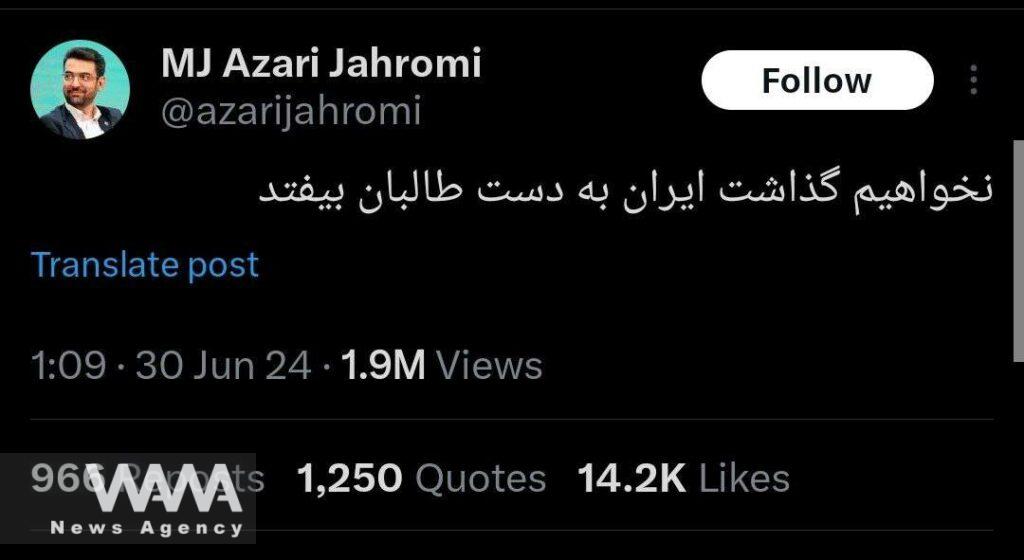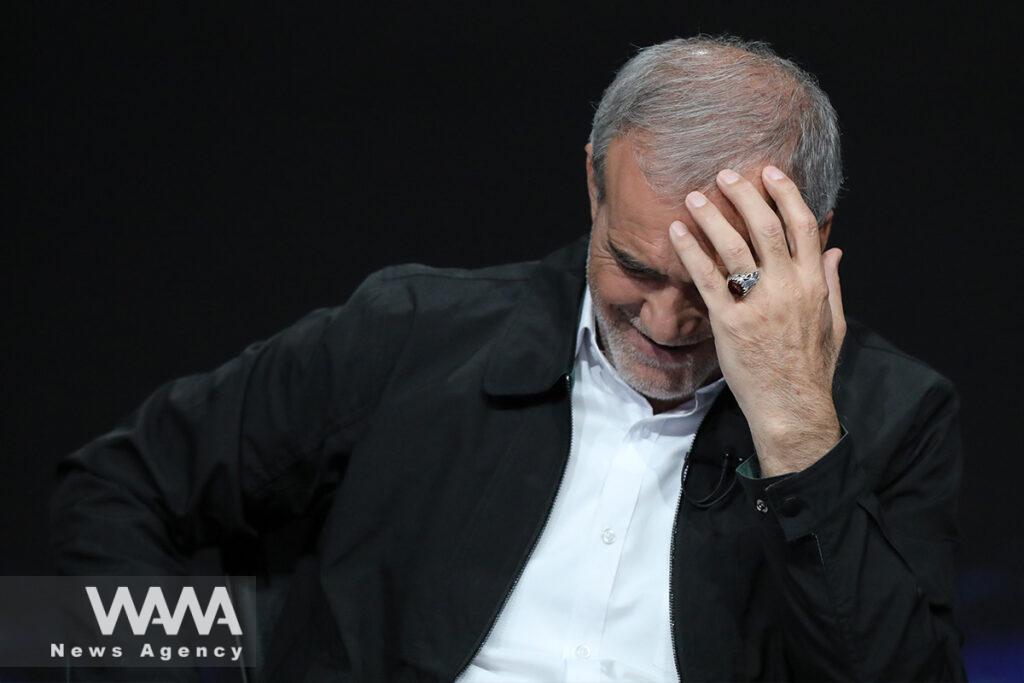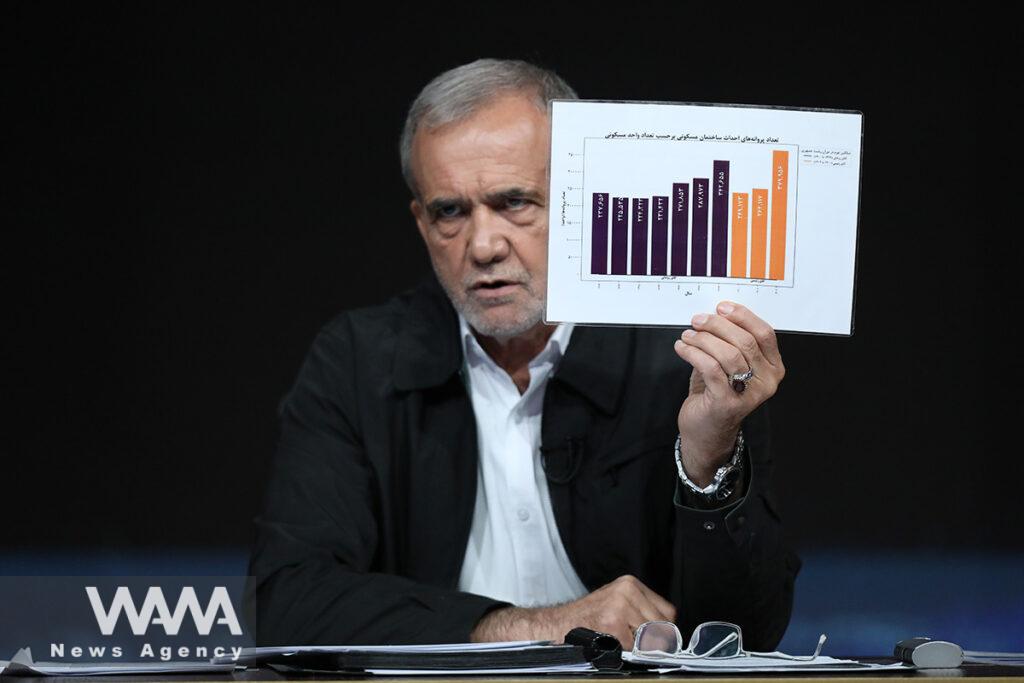A Game of Destruction and Claims
WANA (July 3) – The Iranian presidential elections have always been a scene of tension and controversy. In this cycle, the main competition between Saeed Jalili and Masoud Pezeshkian has drawn significant attention. Both candidates, with different social and political bases, have entered the fray, and their supporters are vigorously trying to weaken the opposing candidate using various methods.
Saeed Jalili, the former Secretary of the Supreme National Security Council and current Member of Parliament, has entered the race relying on revolutionary rhetoric and conservative policies. He has the support of the principled and conservative spectrum of society and has gained considerable popularity among these groups due to his executive background and firm stances on security and nuclear issues.
On the other hand, Masoud Pezeshkian, a former Member of Parliament and former Minister of Health, is known for his reformist leanings and emphasis on social justice and economic development. He has garnered the support of reformists and larger sections of the middle class. Pezeshkian, with his background in healthcare and focus on social issues, aims to present an image of an efficient and people-oriented government.
During the electoral campaign, both candidates and their supporters employ various methods for advertising and garnering votes, one of which is attacking the rival. Although much of this destructive criticism is made without strong evidence, it is clear that both candidates have been involved in making important political and executive decisions, and neither has had direct executive responsibility. This makes the mutual attacks between Jalili and Pezeshkian supporters more politically and propagandistically oriented, as they cannot criticize each other’s executive performance.

Jalili’s supporters use various media and promotional tools to accuse Pezeshkian of inefficiency during his tenure as Health Minister and his inability to manage crises. They point to economic and social problems during Pezeshkian’s management, trying to portray him as an unsuitable presidential candidate. They use official reports, economic statistics, and negative experiences of some individuals with the healthcare system under Pezeshkian as part of their efforts. They also emphasize his insufficient knowledge in various fields and inability to provide expert opinions.
Conversely, Pezeshkian’s supporters attempt to attribute any public discontent to Jalili and the conservatives. They use straightforward and understandable language for the general public, blaming Jalili for various problems. Among the accusations made by Pezeshkian’s supporters are:
– Supporting unfortunate events related to women’s hijab issues.
– Being responsible for the expulsion of students from universities.
– Causing the current economic problems of the country.
– Opposing the JCPOA and causing Iran’s frustration and sanctions.
– And a recent incident where some of Jalili’s supporters used a shocker on a driver with Pezeshkian’s poster, though Jalili condemned this act and promised judicial action, which was promptly taken.
These attacks aim to create a radical image of Jalili, presenting him as someone who will worsen the situation and eliminate existing freedoms if he comes to power. However, these claims lack a strong basis and evidence. It seems that the technique of attacking the rival is more used by Pezeshkian’s supporters, possibly to cover their own weaknesses by highlighting the opponent’s flaws and sometimes even falsely accusing them.

Masoud Pezeshkian, candidate of the reformists for the presidential race of Iran. July 2024. Photo from Saeed Jalili’s office / WANA News Agency
The Impacts of the Attacks:
The electoral attacks from both camps can have varying impacts on the election results. While these methods may weaken the opponent in the short term, they may ultimately reduce public trust in the electoral process and politicians. Moreover, these attacks are often unsubstantiated and mainly involve unsubstantiated claims by the supporters of the candidates.
For Saeed Jalili, attacking Pezeshkian might be effective in attracting the principled and conservative factions, but if he fails to address the economic and social needs of the people, he might lose public support. Conversely, attacking Jalili by Pezeshkian’s supporters could be successful in garnering reformist and middle-class votes, but if Pezeshkian cannot address the executive and managerial challenges, public trust in him will diminish.
Another important aspect is that baseless electoral attacks can tarnish the dignity and reputation of individuals who have genuinely served the country. This is especially significant when candidates or their supporters criticize the performance of respected individuals who are considered national heroes by the public. Such actions can cause anger and resentment among parts of the society who respect these individuals.

The Last Debate, The Most Serious Election Discussion
WANA (July 3) – The second election debate began differently. Masoud Pezeshkian, who had launched his campaign emphasizing the continuation of the late Raisi’s government, revealed a new persona last night and described Raisi’s administration as weak. Pezeshkian’s strategy has significantly changed as election day approaches. He used non-standard political language and occasionally offensive […]
Ultimately, the effectiveness of electoral attacks depends on each candidate’s ability to present tangible programs and respond to the needs of society. Iranian electoral history has shown that people are primarily looking for efficiency and transparency in governance. Thus, any candidate who can gain public trust and convincingly present their plans stands a better chance of winning. Therefore, pointing out the opponent’s weaknesses can only be effective if it involves reasoned criticism accompanied by alternative programs and solutions. Otherwise, simply highlighting the status quo and dissatisfaction will eventually lose its appeal to the audience, who will then demand programs from the critic.
These types of attacks not only fail to lead to the desired electoral outcomes but also damage public trust. Ultimately, the people of any country should seek solidarity and joint efforts for the progress and development of their nation rather than destructively criticizing each other.
By: Mahsa Jafari

Masoud Pezeshkian, candidate of the reformists for the presidential race of Iran. July 2024. Photo from Saeed Jalili’s office / WANA News Agency












